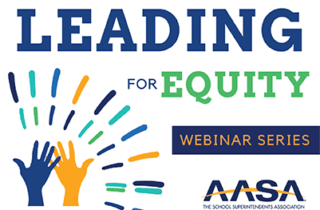With the pandemic has come a reckoning on how big the digital equity gap is in the United States. During an edWebinar sponsored by ClassLink and co-hosted by CoSN and AASA, three superintendents discussed their observations about digital equity and what their districts need to do next.
The pandemic, while a great disruption in schools, is also an opportunity for change. According to presenters of a recent edWebinar, hosted by AASA, The School Superintendents Association and AASA’s Leadership Network, as school leaders look to reopen their schools, they shouldn’t just be focused on logistics. In addition, they need to ask themselves: Is my school truly responsive to student needs, and if not, how can I make the school work for all students?
Presented by Dr. Mark Benigni, Superintendent, Meriden Public Schools (CT); Dr. Alan Seibert, Superintendent, Salem City Schools (VA); Dr. Jason Van Heukelum, Superintendent, Winchester Public Schools (VA); and Diane W. Doersch, Technical Project Director for Digital Promise and the Verizon Innovative Learning Schools (#VILs) Program
Moderated by Ann McMullan, Project Director, EmpowerED Superintendent Initiative, CoSN (Consortium for School Networking)
Ending systemic injustices and dismantling long-standing barriers isn’t easy, and district leaders engaged in the process recently identified procedures and tools that have helped them support and guide their districts during their “equity journeys.” During an edWebinar hosted by AASA, The School Superintendents Association and AASA’s Leadership Network, Dr. Leila Nuland, Managing Director of the K-12 Research Team at Hanover Research, explained how district leaders can compile and utilize data on educational equity. Then, Dr. Daryl Camp, Superintendent of the San Lorenzo Unified School District in California, and Dr. Gregory Hutchings, Superintendent of the Alexandria City Public Schools in Virginia, discussed the priorities and processes they have established to increase equity in their districts.
“Despite decades of existing research, most professional development programs fail to adhere to established criteria for effectiveness. The Center for Public Education found that while over 90% of teachers reported that they engaged in some type of professional development during the year, most found it to be completely ineffective.” In a recent edWebinar, sponsored by ClassLink and co-hosted by CoSN and AASA, three district leaders from Wake County Public School System Superintendent Cathy Moore, Senior Director of Digital Learning and Libraries Allison Reid, and Marlo Gaddis, Chief Technology Officer, discussed critical guidelines for implementing successful professional technology development.
While equity requires vision from its leaders, it also requires courage. During the edWebinar, “Leading for Equity: Courage to Lead with an Equity Agenda,” hosted by AASA, The Superintendents Association and AASA’s Leadership Network, Dr. Khalid Mumin, Superintendent of Reading School District (PA), and Marlon Styles, Superintendent of Middletown City Schools (OH), discussed the challenges they faced and the tough decisions they made to keep their equity agenda moving forward.
Can a new type of curriculum actually turn failing schools into successful ones, and result in greater success for students as well? This question was answered affirmatively and with confirming evidence during a recent edWebinar, hosted by AASA, The Superintendents Association and AASA’s Leadership Network, with educator and author Jay McTighe, and the superintendent and deputy superintendent of Mount Vernon City School District (NY), Dr. Kenneth Hamilton and Dr. Jeff Gorman.
Equity is one of the most overused terms in education—not just because most can’t agree on a definition, but because the promise of equity is often not backed up by action. In the edWebinar, “Leading for Equity: Intentionality for Access and Opportunity,” hosted by AASA, The Superintendents Association and AASA’s Leadership Network, Dr. Gustavo Balderas, Superintendent of Edmonds School District (WA), and Dr. Heath Morrison, Superintendent of Montgomery Independent School District (TX), discussed how they’ve approached building equity throughout their careers and why acting upon an equity agenda is an urgent, right-now need.
Preparing all students for college and 21st century careers can no longer be the sole responsibility of K-12 educators. Increasingly, district administrators need to add another task to their already long checklists—forging partnerships with organizations that can supplement and enhance the education being provided by local schools.
As schools reckon with learning equity, they’re often focused on academic progress. During the edWebinar, “Leading for Equity: Academic Development Through an Equity Lens,” hosted by AASA, The Superintendents Association and AASA’s Leadership Network, the presenters talked about the important role social-emotional learning (SEL) plays in the process. In fact, they argued that schools must connect academic equity with SEL if they’re going to reach their goal of serving all students.





